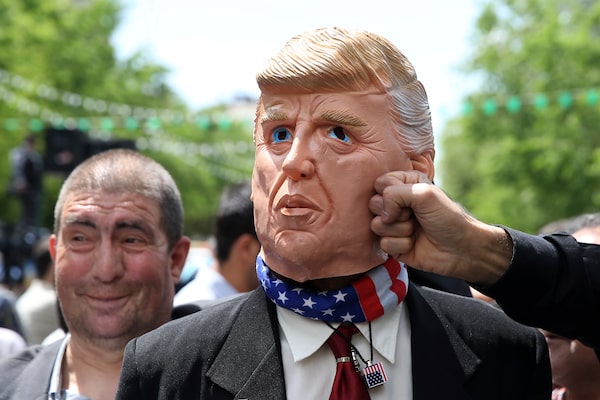
Most Iranians believe a war will not come to the region, although they remain willing to defend their country if U.S. President Donald Trump orders an attack.Ebrahim Noroozi/The Associated Press
Across Iran’s capital, the talk always seems to come back to how things may get worse.
Battered by U.S. sanctions and its depreciating rial currency, Iran’s 80 million people struggle to buy meat, medicine and other staples of daily life. Now they wonder aloud about U.S.intentions as the Trump administration rushes an aircraft carrier and other forces to the region over a still-unexplained threat it perceives from Iran.
The Associated Press spoke to a variety of people on Tehran’s streets recently, ranging from young to old, from women wearing the all-encompassing black chador to those loosely covering their hair.
Most say they believe a war will not come to the region, though they remain willing to defend their country. They think Iran should try to talk to the United States to help its anemic economy, even as they see U.S. President Donald Trump as an erratic and untrustworthy adversary.
“Trump is not predictable at all and one doesn’t know how to react to him and what is the right thing to do against him,” said Afra Hamedzadeh, a 20-year-old civil servant and university student. “Since he controls the global economy we are somehow left with few options.”
But opinions vary across Iran’s capital, Tehran, depending on whether you speak to someone coming out of Friday prayers, in the back of a shared taxi cab, or exiting the coffee shops popular with young people.
“If America could do anything, it would have done many things by now,” said the chador-wearing Zoherh Sadeghi, a 51-year-old housewife coming out of prayers. “It can’t do anything. It can’t do a damn thing.”
That’s an opinion shared by 35-year-old office worker Massumeh Izadpanah.
“When someone keeps trying to scare you, it means that they think they are not yet ready for war. When someone really wants war it starts the war right away. Like when Iraq attacked us, all of a sudden bombs were dropped,” she said. “But right now America just says ‘I’m coming,’ to scare Iran.”
A young nation, many across Iran were alive for its bloody 1980s war with Iraq, a conflict that began when dictator Saddam Hussein invaded and dragged on for eight years. That war, in which Saddam used chemical weapons and Iran launched human wave attacks, killed 1 million people.
Since Mr. Trump withdrew the U.S. from Iran’s nuclear deal with world powers last year, state television increasingly has focused attention on that war’s wounded.
In Tehran’s southern Javadieh neighbourhood, veteran Mohammad Ali Moghaddam said he was ready to fight again.
“I would encourage my three sons and grandsons to go to defend Iran too,” said Mr. Moghaddam, a 58-year-old welder.
Arezou Mirzaei, a 37-year-old mother of two in central Tehran, is more worried.
“I think the government should do something to avoid war,” Ms. Mirzaei said. “If war was good, then Afghanistan and Iraq would not be the mess that we see on TV.”
Taxi driver Jafar Hadavand, 34, agrees.
“I think both sides will be losers if they fight each other,” Mr. Hadavand said. “I think there are wise people on both sides to advocate peace, not war.”
Still, many pointed to the economy, not the possible outbreak of war, as Iran’s major concern. Iran’s rial currency traded at 32,000 to US$1 at the time of the 2015 nuclear deal. Now it is at 148,000, and many have seen their life’s savings wiped out.
Nationwide, the unemployment rate is 12 per cent. For youth it’s even worse, with a quarter of all young people unemployed, according to Iran’s statistic centre.
“The economic situation is very bad, very bad. Unemployment is very high, and those who had jobs have lost theirs,” said Sadeghi, the housewife. “Young people can’t find good jobs, or get married, or become independent.”
Sores Maleki, a 62-year-old retired accountant, said talks with the U.S. to loosen sanctions would help jump-start Iran’s economy.
“We should go and talk to America with courage and strength. We are able to do that, others have done it,” Mr. Maleki said. “We can make concessions and win concessions. We have no other choice.”
But such negotiations will be difficult, said Reza Forghani, a 51-year-old civil servant. He said Iran needed to get the U.S. to “sign a very firm contract that they can’t escape and have to honour.” Otherwise, Iran should drop out of the nuclear deal.
“When someone refuses to keep promises and commitments, you can tolerate it a couple of times, but then certainly you can’t remain committed forever. You will react,” Mr. Forghani said. “So I don’t think we should remain committed to the deal until the end.”
Yet for Iran’s youth, many of whom celebrated the signing of the 2015 nuclear deal in the streets, the situation now feels more akin to a funeral. Many openly discuss their options to obtain a visa — any visa — to get abroad.
“Young people have a lot of stress and the future is unknown,” said Mr. Hamedzadeh, the 20-year-old civil servant. “The future is so unknown that you can’t plan. The only thing they can do is to somehow leave Iran and build a life abroad.”